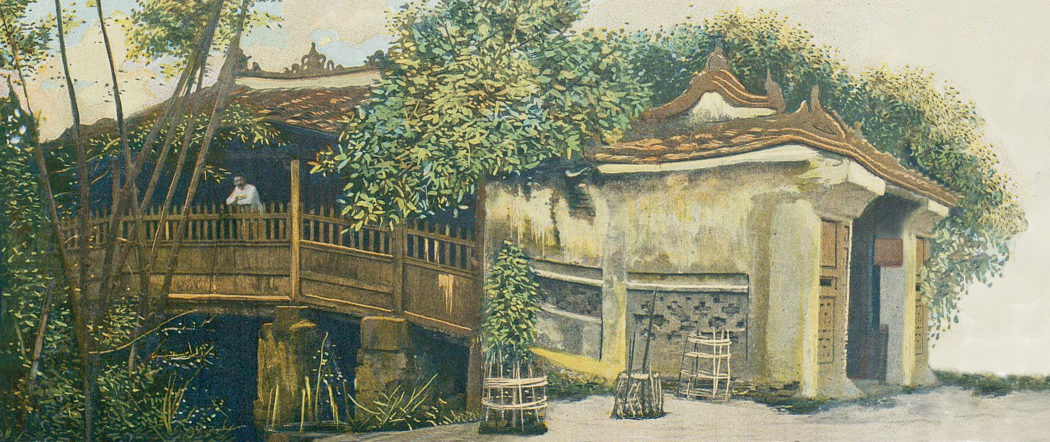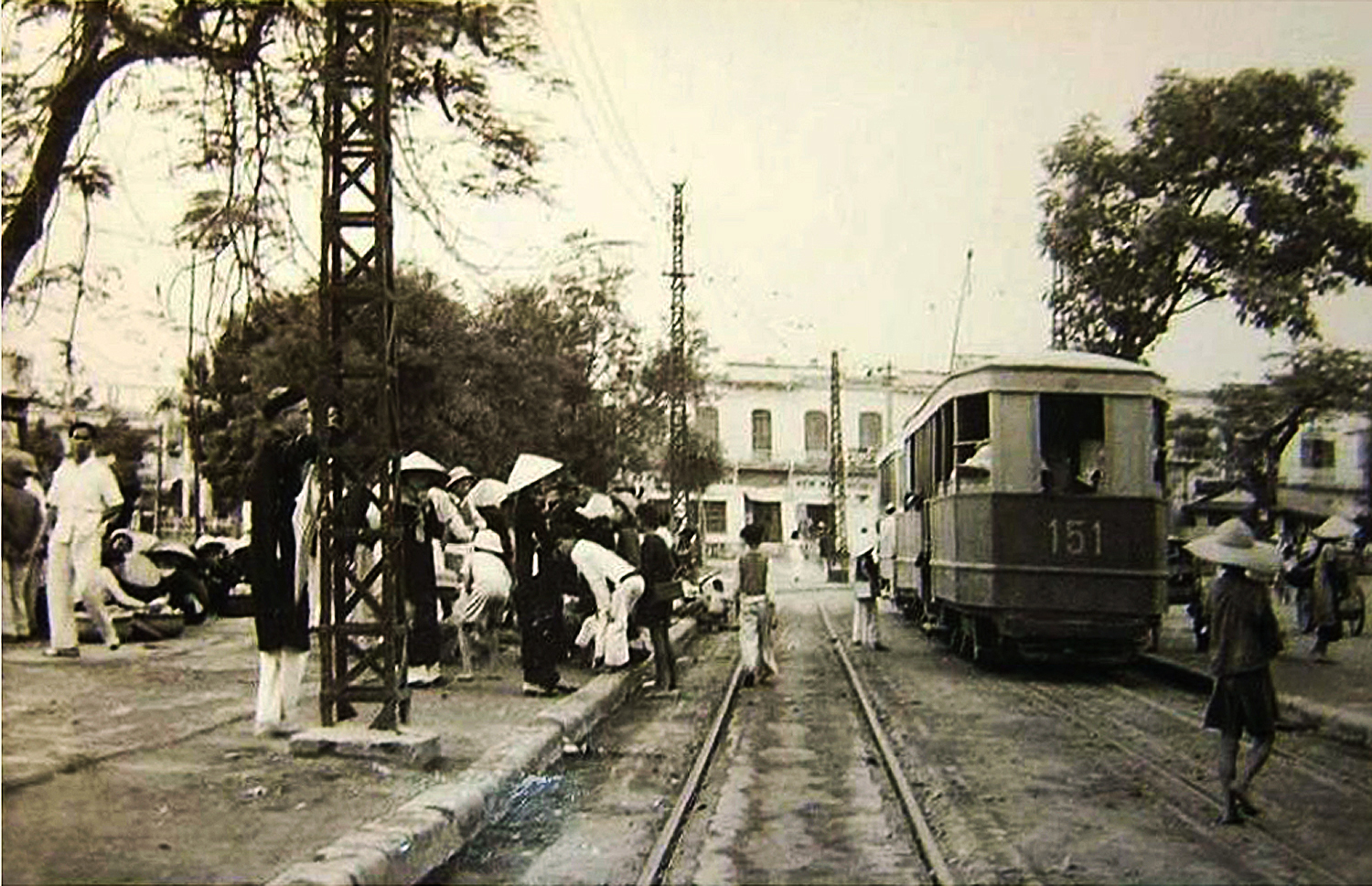
The place des Cocotiers (Petit Lac) tramway interchange in 1952
Demoted and then sacked by the Vichy authorities for being Jewish, Hanoi Tramways Company director Léo Lippmann spent several years trying to get his job back.
The anti-Semitic statutes passed by the French Vichy government were extended to Indochina through a series of laws promulgated by the colonial authorities in 1940-1941. At that time, around 1,000 Jewish people were said to be living in Indochina, where they were engaged in a variety of professions, ranging from the colonial armed forces and administration, to banking, insurance, advertising and commerce.
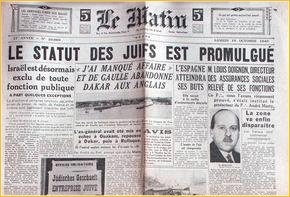
Le Matin newspaper, 2 October 1940
Though many are known to have lost their livelihood as a result of anti-Jewish legislation, only one dismissal – that of Hanoi Tramway Company Director Léo Lippmann in May 1942 – was high-profile enough to warrant intervention by the highest echelons of the colonial administration.
The anti-Semitic laws were repealed in January 1945, but government bureaucracy, coupled with the confusion surrounding the company’s inept interim management, delayed Lippmann’s reinstatement until March 1945. Léo Lippmann left the Hanoi Tramway Company in 1948.
The following two documents were found in the file of Paul Louis Gabriel Chauvet (23 August 1944-9 March 1945), Acting Résident-Supérieur of Tonkin.
Memo by Léo Lippmann to Résident-Supérieur Chauvet, 21 February 1945
On 18 December last, you called for me and indicated that you desired my opinion on the current exploitation of the tramways. It was thus that I was led to inform you that, for the last year, the affairs of that company have been so mismanaged that the Protectorate of Tonkin should expect, in a relatively short period, to see the people deprived of this convenient means of transport.
In support of my assertions, I give you the precise reasons for the fears which I have had for some time regarding the future of this public service, which rests under your close supervision.
The Hanoi tramway network was built in 1900. From the technical point of view, its construction was undertaken in conformity with the Agreement specifications and the diverse rules which were reproductions of texts then in use in the Metropole.
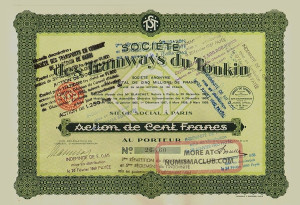
A share certificate of the Société des Tramways du Tonkin
Over 40 years, a number of these rules have been modified, repealed or replaced by others. In general, these modifications have primarily been intended to increase public safety (travellers, train circulation, neighbouring facilities, etc.).
In accordance with the rules laid down in these texts, there are certain types of modification which must be implemented immediately, while other types may be left until the occasion of a major replacement of a section of track. Bearing this in mind, it is appropriate to consider what has just happened.
Track
The replacement of all of the Vignole rails on the Village du paper (làng Giấy) line has recently been carried out. However, not only did they ignore the procedures set out by the regulations for major works projects; in addition, they destroyed many of the improvements which had been carried out in recent years with the full agreement of the Directorate of Public Works Control Service, in order to satisfy certain decrees and ordinances currently in operation. The track was thus rebuilt in absolutely indefensible conditions and in violation of regulations, without due regard for safety. It does not take an expert to recognise that the rules of track laying – particularly those relating to curves and rail joints – have been ignored.
As a result, there is now a serious risk of accidents involving persons, as well as accidents involving rolling stock, which are expensive as well as being irreparable at present (axles, wheel rims, etc…).
Meanwhile, points – which should have been replaced as a matter of utmost emergency, since they are always the devices which present the greatest degree of wear – have still not been replaced.
Rolling stock
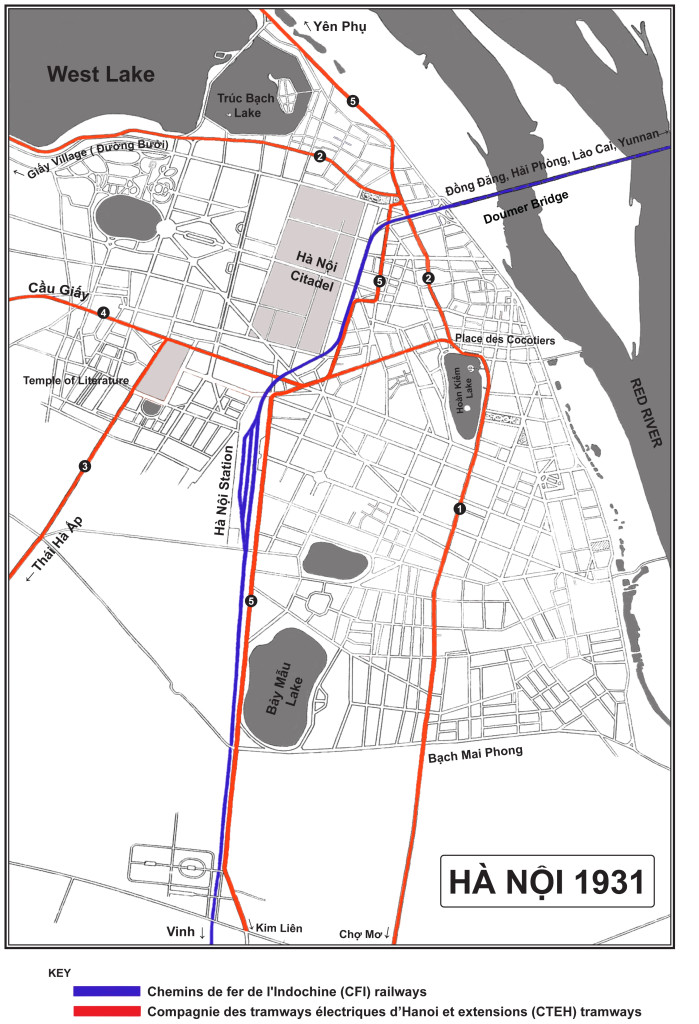
A Hà Nội Tramway map of 1931
The tramway was built to transport passengers. When one sees passing through the streets of Hanoi wagon loads of passengers at full volumetric capacity – that is to say overloaded – one shudders to think of the potential consequences of a serious accident, which is always possible in such cases. One must also ask what negative impact may ensue, both from a mechanical standpoint and from the point of view of good conservation of rolling stock, as a direct result of the overloads thus imposed on the tramway cars.
The recent modifications to the car access doors also constitute a serious hindrance to the rapidity of services. They reduce the safety of passengers and are absolutely incompatible with the current line capacities of the Hanoi network .
From all of the above, it appears that expensive work carried out recently has decreased public safety. This work was carried out in violation of regulations, and was completed to such a poor standard that both track and rolling stock will now be subject to premature wear … creating technical problems which it will be impossible to rectify for many years.
Personnel
As you know, M. Résident-Supérieur, most of the company’s old staff, both European and Annamite, have been laid off, mostly without any reason of poor performance. I readily acknowledge the possibility that some of these officers did not have a thorough knowledge of their profession, and did not always exercise their duties with all the desirable professional conscience; especially the motormen, receivers and controllers. But has it been possible to replace them all with better staff?
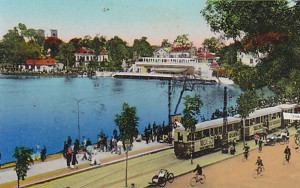
A line 1 tram skirts the Petit Lac (Hoàn Kiếm Lake) in the 1950s
One particular issue which has been brought to your attention is the dismissal without cause of four of the five European agents who made up the management team of the Company.
One of these – a Foreman – had nine years of service; he worked under four successive directors and has consistently rendered to the Company such excellent service that in November 1943, the last director, M. Gauthier, awarded him a distinction. Another, a Chef-controleur who worked 10 to 12 hours each day, often going without lunch to monitor effectively the receipts from trains on every line, has also been laid off.
I am sure that you understand better than I, M. Résident-Superieur, how difficult it is to replace such excellent staff.
The result of these abusive measures, which came so quickly, is that at the present time there remains in this company only a single management staff member who has even the most elementary notion of how a conceded public service like this should be run.
In this connection, on 8 April 1944, Hanoi was bombed and the tramway network was damaged in several locations. Yet the Director chose this moment to take a short vacation at a resort, travelling there in the single automobile which is exclusively devoted to servicing the company. He was immediately made aware of the bombing, yet despite this, he continued with his holiday plans and did not return to Hanoi until three or four days later, depriving the network for several days of its automobile, which is indispensable in such circumstances. When he finally returned, he made only very brief (and late) morning appearances in areas not too close to the centre of the city, during the hours when aerial bombing was a possibility.
This same Director, during the Tet holiday in 1944 and again this year, was absent on each occasion for 10 consecutive days, once again taking the company automobile for his own use.
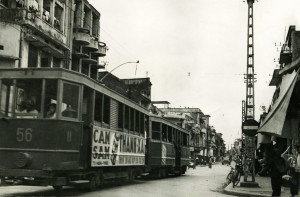
A line 2 train pictured on rue du Sucre (phố Hàng Đường) in the 1940s
In this connection, it should be noted that during the few days preceding and following the Tet holiday, the quantity of travellers using the tramway is far superior to that at any other time of year.
It is to say the least strange to see the head of a company abandon his post during the one short period of year when his business becomes overloaded with work. It is all the more strange since this is a public service, the director of which has no right to be idle.
To all the above, one should add other issues which are particularly serious, shameful and scandalous, and which it is impossible to tolerate in a public service falling under the control of the Administration. Two of those issues were the subject of my letters of 9 and 10 October 1944 to the Attorney General at the Courts of Appeal of Hanoi.
Then there is the famous case of the cement, which was the subject of my letter of 15 March 1944 to the Governor General, a letter to which I attached a telegram destined for my company’s head office in Paris, a telegram which at the time the Administration judged that it would not transmit.
Finally, there is the recent massive sale of metals, in conditions which would be rather unusual anywhere, let alone in a country which suffers a foreign occupation; this issue has been the talk of the city, because everyone knows the destination of most of those metallurgical products.
All of the preceding suggests gross professional incompetence from an operational point of view, not to mention a scandalous lack of morals where the cement affair and the sale of several hundreds of tonnes of metal are concerned.
I leave you to contemplate what might be the reaction of the Board of Directors of the Company in Paris when it will be possible for me to make it aware of this lamentable situation, which I shall not fail to do by the first post leaving for France.
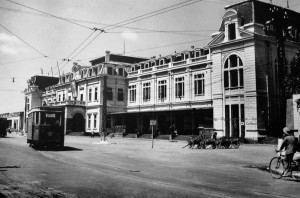
A line 5 train pictured outside Hà Nội Station in 1960
It will certainly have not escaped your notice that, under the Convention on the one hand and the decree of 3 March 1936 and the ordinances which regulate this conceded public service on the other, you have the right to investigate the matter in depth. This monitoring should have been carried out by the company, but the present situation makes it materially impossible for the Board of Directors to act.
You have under your control the Public Works Department, and if some of the facts reported above were able to reach this service, which does not normally enter into questions of internal detail, there are competent individuals there who, even if they had not seen it for themselves (which seems to me impossible), would charge the Director with culpable negligence. In particular, the modifications to carriages and the replacement of the rails on the Village du papier line could not escape their notice.
Yet:
1. My right to exercise the duties of Director were suspended in accordance with the Law of 2 June 1941.
2. I was subsequently instructed to retire without delay from the Société des Tramways by Letter No. 10419 of May 1942 from the Chief Engineer of the Circonscription of Tonkin, acting on the orders of M Résident-Supérieur of Tonkin.
This last decision constitutes a flagrant violation of the laws of 2 June and 17 November 1941.
Most recently, the ordinance of 11 January 1945 now “reports” that these laws never existed. By consequence, we cannot pretend today that the decisions taken in application of said laws continue in force.
The above-mentioned ordinance of 11 January 1945 has ended the suspension of the exercise of my directorial duties, with the result that since then I have been reinstated by the said ordinance (which incidentally has retroactive effect) in my functions as Director of the Société des Tramways. It is officially and in this capacity that I address you now.
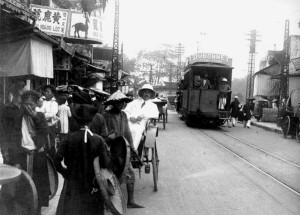
A line 2 train comprising original 1900 stock heads north along rue de la Soie (phố Hàng Đào) in the early 1930s, photo by Charles Peyrin
This situation is all the more serious as my directorial powers were delivered to me by the Board of Directors of the company at its meeting of 24 November 1936, powers which my company took the precaution of never annulling.
Indeed, I am the only person in Indochina who is bound to the Société des Tramways by a contract approved by the Board of Directors at its meeting of 24 November 1936, a contract which not only has never been suspended, but was also extended until my return to France, with the option for me to renew at that time.
I will add that if at present, despite the letter that I addressed to you on 1 February 1945, I have not been able to resume my role as Director of the tramway company, this is a delay brought about by the Administration, which must bear full responsibility.
After being the victim of an interpretation of the Law of 2 June 1941, it seems that I am now a victim of absolutely unacceptable procrastination; I thus have every reason to suppose that I have been the subject of defamatory allegations on the part of my “successors” – this could be the only explanation for the persistence with which obstacles to my reintegration continue to multiply. I would like to know, M, Résident-Supérieur, whether you believe these defamations, or whether you wish instead to shine full light on what has really been happening at the Société des Tramways since my eviction.
I am naturally at your disposal to provide all the necessary clarifications and thus to wash off all the calumnies with which I have been covered.
I would add that when this matter is finally resolved, the scandal may appear even more serious when the incomprehensable delay occasioned by the authorities is revealed.
Hanoi, 21 February 1945
Signed: LIPPMANN
Hôtel Metropole, Hanoi
Note from the Head of the 1st Bureau to Résident-Supérieur Chauvet, 3 February 1945
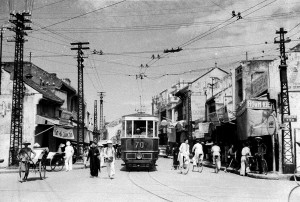
A northbound line 2 train nears the Chateau d’eau (Đồn Thủy Water Tower on phố Hàng Đậu) in the 1940s
The repeal of the laws on the Jews raises the question of the reinstatement of M. LIPPMANN to his former post as Director of the Compagnie des Tramways, currently directed by M. PETOT (being substituted by M. JOUVELET)
Various points should be examined in turn:
1. Exclusion of M. LIPPMANN by the Compagnie des Tramways
The first law on the Jews, that of 3 October 1940, did not affect M LIPPMANN, who is the issue of two Catholic grandparents and was not married to a Jewish woman (although he had previously been married to a Jewish woman, he was subsequently divorced).
The following law, that of 2 June 1941, affected M. LIPPMANN, because he was the issue of two Jewish grandparents and could not prove that he had embraced a faith other than the Jewish faith.
Also, shortly after its release, the Board of Directors of the company decided, in order to remain within the law, to appoint M. BAUDOT as Director, while maintaining M. LIPPMANN as Ingenieur-Council (in effect, the new legislation only forbade Jews from occupying the positions of directors of companies and conceded public services).
At the end of April 1942, M. BAUDOT was replaced as Director by M. GAUTHIER.
Almost immediately, in May 1943, the Administration decided to expel M. LIPPMANN from his position of Ingenieur-Conseil with the Compagnie des Tramways. For that dismissal, it cited a new law, that of 17 November 1941, which amended Article 5 of the Law of 2 June.
M. LIPPMANN argued that he did not fall under the application of the Law of 17 November. The question was then referred to the Governeur General, who responded (all too briefly, in my opinion) that M. LIPPMANN was affected by the new measures.
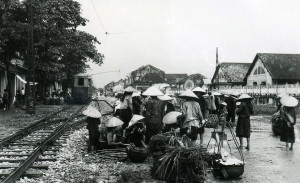
A line 2 tram service at the Village du papier (Giấy village) terminus in the 1930s
M. PIRIOU produced a telegram from France (Compagnie des Tramways de Marseille), which was favorable to the thesis of M. LIPPMANN.
But M. Résident Supérieur DELSALLE refused to challenge the Governor General, saying that “the intepretation of the Governor General is sufficient, and it’s a question of acting rather than quibbling.” Consequently, the Compagnie des Tramways was instructed to dismiss M. LIPPMANN.
Without getting into the detail of this legal discussion, we must recognise that the text used to justify the treatment of M. LIPPMANN (the Law of 17 November 1941) is far from clear, and that the Governor General could not have understood its spirit unless he consulted the legislator in Paris who had drafted it.
The opinion of the 1st Bureau has not varied since the day it suggested that the Resident Superieur should challenge the Secretariat of the Governor General on this issue, submitting a draft letter which was never signed.
The 1st Bureau believes that the way in which the Law of 17 November has been applied to M LIPPMANN is questionable. In any case, it is undeniable that we have failed to take account of the provisions of the Article of the Law of 2 June 1941 which permitted M. LIPPMANN to remain on the staff of the Tramways Company in a capacity other than that of Director (ie as Ingenieur-Conseil), by virtue of the fact that he was the holder of the Croix de Guerre, 1914-1918.
This mistake is likely to engage the pecuniary responsibility of the Administration, in respect of damages due not only to M. LIPPMANN, but also to the Compagnie des Tramways if the latter can one day demonstrate that the Governor-General’s decision precipitated a loss of income.
2. Appointment of M. PETOT
M. GAUTHIER, Director of the Compagnie des Tramways, died in Hanoi on 27 December 1943.
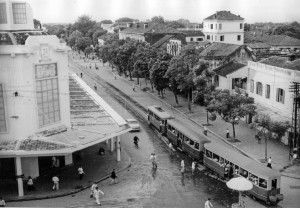
A line 1 tram passes in front of the Grand Magasins Réunis in the 1950s
M. LIPPMANN, who at that time was no longer an employee in the eyes of the Administration, but who retained the powers invested in him by his Head Office in Paris, was still concerned about the affairs of the company and had even officially given advice to M. GAUTHIER. He met M. BAYLIN, Director of the Bank of Indochina, and suggested that, in the interests of the company, the latter should urge the Board of Governors of the Compagnie des Tramways in Paris to offer the job temporarily to M. FOURNIER.
The Compagnie des Tramways answered that it had named M. LECUYER (of Haiphong Glass) as the new Director, and that, pending the arrival of the latter in Hanoi, it had empowered M. FOURNIER to act as company signatory. Messrs LIPPMANN and FOURNIER both received a telegram from the Head Office saying: “Board of Directors makes arrangements and trusts you.” This happened in the second half of January 1944.
A few weeks before, that is to say just after the death of M. GAUTHIER, someone other than M. LIPPMANN also intervened in the matter.
On 30 November (remember that M. GAUTHIER had died on 27 November) M. DALOZ charged M. PETOT with the job of directing the Compagnie des Tramways du Tonkin.
I do not know if M. DALOZ acted in agreement with the Head Office of the Compagnie des Tramways. M. DALOZ does not belong to that organisation, but is an employee of the Société Financière, which was once the parent company of the tramways company before it gave up its interests (in this case by selling all of its shares) in the Compagnie des Tramways. The only link between the tramway company and the Société Financière is that they have a common Administrator, M. BERNARD.
M. PETOT, busy with his stationery business in Bac-Ninh where he was resident, charged his cousin M. JOUVELET with the job of Director of the Compagnie des Tramways du Tonkin.
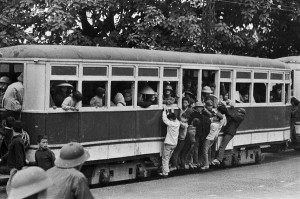
A packed tramcar in March 1973 by © Bettmann/CORBIS
In March 1943, M. LIPPMANN, assessing critically the management of the Compagnie des Tramways (particularly the cement affair), wished to alert his headquarters by cable about what had happened. However, the Government General refused to forward the telegram. Instead, on 26 April, they sent a telegram to our department, copy to the Inspection General of Public Works, asking us officially to appoint the new Director (then M. PETOT) and to give him regular powers. This telegram also mentioned their refusal to transmit M. LIPPMANN’s telegram to the President of the Board of the Compagnie des Tramways du Tonkin in Paris (M. TOCHE).
In response to this telegram, our department transmitted a telegram from M. BLANCHET, Notary in Paris, saying that the Compagnie des Tramways had confirmed the appointment of M. PETOT as Director in replacement of M. GAUTHIER, adding that powers had been give to M. PETOT by deliberation of a meeting of the Board held on 30 December 1943, and filed with the notary on 4 April 1944.
The Residence Superieur has not been kept informed of this exchange of correspondence, which I did not know about until three days ago.
Note that this date of 30 December 1943 is the date on which the effective management of the tramways by M. PETOT (appointed by M. DALOZ) commened.
It is difficult to explain how, only three days after the death of M. GAUTHIER, a Board meeting could be held in France in order to replace the deceased Director. One understands even less how the same Board was able, subsequent to this deliberation (in January 1944), to agree to another one which gave powers to a third person: M. LECUPER.
Neither M. LECUYER nor M. PETOT live in Hanoi, The first resides in Haiphong, while the second lives in Bac-Ninh.
3. Current situation
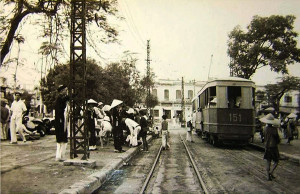
The place des Cocotiers (Petit Lac) tramway interchange in 1952
It is noted that the Board has never revoked the powers of M LIPPMANN. The latter still holds them. He has simply found it a legal impossibility to exercise them, due to the legislation on the Jews and the interpretation given to these texts by the Indochina administration.
Two people are currently holders of powers enabling them, legally, to direct the Compagnie des Tramways du Tonkin: Messrs PETOT and LIPPMANN.
The powers of M. LIPPMANN are of unquestionable regularity. Those of M. PETOT are perhaps also in order, but it seems that they were given him in conditions which require some clarification.
The preparation of laws against the Jews is the only reason why M. LIPPMANN vacated the post of Director of the Hanoi Tramways and, as a consequence, the only reason why M. PETOT was appointed to this position.
Now that this law is repealed, it is natural and logical that M. LIPPMANN should resume the place currently occupied by M. PETOT.
Other reasons militate in the same direction:
M. LIPPMANN occupied this post before; he undoubtedly has the confidence of his Head Office – that is clear from numerous documents (telegrams) in the dossier that we hold.
M. PETOT, on the other hand, does not seem known to the Head Office; he was appointed Director of Tramways as a result of the circumstances just reported. He does not live in Hanoi and does not actually run the company, having appointed his cousin M. JOUVENET to carry out his duties. The latter, in the view of the Control Service, does not have the required technical competence and is not surrounded by competent advisers.
Finally and above all, the morality and professional awareness of M. LIPPMANN has never given rise to criticism. M. le Resident Superieur can read the files in order to learn more fully about this subject.
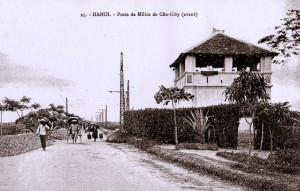
Pont du Papier (Cầu Giấy) tramway terminus in the 1930s
In contrast, M. PETOT, a man of Italian origin, was reported by the Tonkin police (report of 13 June 1944) for failure to declare stock of 89 tonnes of cement “for which he was unable to provide legal documents, and which were acquired as a result of transactions with various private traders” – in other words, using good French, which came from the black market.
Résident-Supérieur HAELEWYN added the following in his letter to the Governor General. dated 24 June: “M. PETOT has all too frequently manifested a tendency to place his personal interests above the general interest.”
Just recently, on the subject of the Compagnie des Tramways, the Chief Engineer of Public Works (Control Service of the Tramways), which never had to complain about M. LIPPMANN’s management, formulated in a very alarming way its most express reservations on the management of M. PETOT. “I note with very particular concern the very poor technical management of the current leadership. It seems to be trying to generate all the piastres it can make, without concern for the durability of the rolling stock, the quality of services rendered, and the safety of travellers.”
“For example: The Jewish engineer, when questioning the real and dangerous errors he had observed in the laying of 25kg rails in place of 18kg ones, received the answer that the old equipment had to be changed as soon as the new arrived, and this as quickly as possible, any precaution and any comprehensive plan to be considered as superfluous and negligible against the fact that the company might expect to lose on the resale value of the deposited material. This indicates technical skill and professional conscience of a standard which I leave to the assessment of a superior, but it is certain that someone with such a notion of his duties will hardly encourage others to exercise good practice in the management of the company.”
The Mayor of the Municipal Government, after being given a similar account of the tramway’s technical services, could not remain indifferent. He said that, while he could not intervene in the Jewish question, it was necessary to remove M. PETOT forthwith from the Compagnie des Tramways.
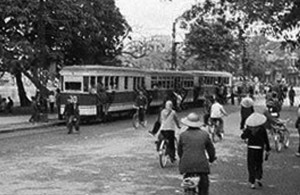
Another line 1 tram skirts the Petit Lac (Hoàn Kiếm Lake) in the 1960s
The administration is doubly interested in ensuring that the tramways do not disappear, firstly because of the services they render to the public, now more than ever, and secondly because they are a conceded network of the railways and the administration must ensure its royalties on the revenue of the company.
Proposals
Since it is not possible to correspond with the Head Office in France to ask it to relieve M. PETOT from the post of Director of Tramways, the only option left to the Administration is to relieve him itself.
M. Résident-Supérieur may, after obtaining the agreement of the Governor General, explain the situation to M. PETOT and instruct him to retire. In the case of M. PETOT offering resistance, he should be put on notice and forced to step down. This procedure is justified because of his poor management.
Alternatively, the Resident of the Civil Court could be asked to remove him on the grounds of the powers he has misused. The Resident is already of the opinion that the Jewish question should not be raised. Moreover, the case would then require a thorough review, which has not been carried out so far.
M. LIPPMANN could then be advised that nothing further prevents him from exercising the powers he was given by the Head Office in 1936, and could resume effective management of the Société des Tramways du Tonkin. The conditions of his service must be fixed in agreement with the Control Service of the Direction of Public Works.
In the event that M. le Resident Superieur shares this view, he should contact the Governor General and ask for his consent first, before acting.
Hanoi, 3 February 1945
Head of 1st Bureau
See also Hanoi Tramway Network
Tim Doling is the author of The Railways and Tramways of Việt Nam (White Lotus Press, Bangkok, 2012) and also gives talks on Việt Nam railway history to visiting groups.
A full index of all Tim’s blog articles since November 2013 is now available here.
Join the Facebook group Rail Thing – Railways and Tramways of Việt Nam for more information about Việt Nam’s railway and tramway history and all the latest news from Vietnam Railways.

